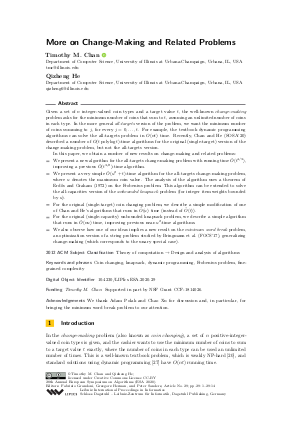@InProceedings{chan_et_al:LIPIcs.ESA.2020.29,
author = {Chan, Timothy M. and He, Qizheng},
title = {{More on Change-Making and Related Problems}},
booktitle = {28th Annual European Symposium on Algorithms (ESA 2020)},
pages = {29:1--29:14},
series = {Leibniz International Proceedings in Informatics (LIPIcs)},
ISBN = {978-3-95977-162-7},
ISSN = {1868-8969},
year = {2020},
volume = {173},
editor = {Grandoni, Fabrizio and Herman, Grzegorz and Sanders, Peter},
publisher = {Schloss Dagstuhl -- Leibniz-Zentrum f{\"u}r Informatik},
address = {Dagstuhl, Germany},
URL = {https://drops.dagstuhl.de/entities/document/10.4230/LIPIcs.ESA.2020.29},
URN = {urn:nbn:de:0030-drops-128958},
doi = {10.4230/LIPIcs.ESA.2020.29},
annote = {Keywords: Coin changing, knapsack, dynamic programming, Frobenius problem, fine-grained complexity}
}

 Creative Commons Attribution 3.0 Unported license
Creative Commons Attribution 3.0 Unported license
















